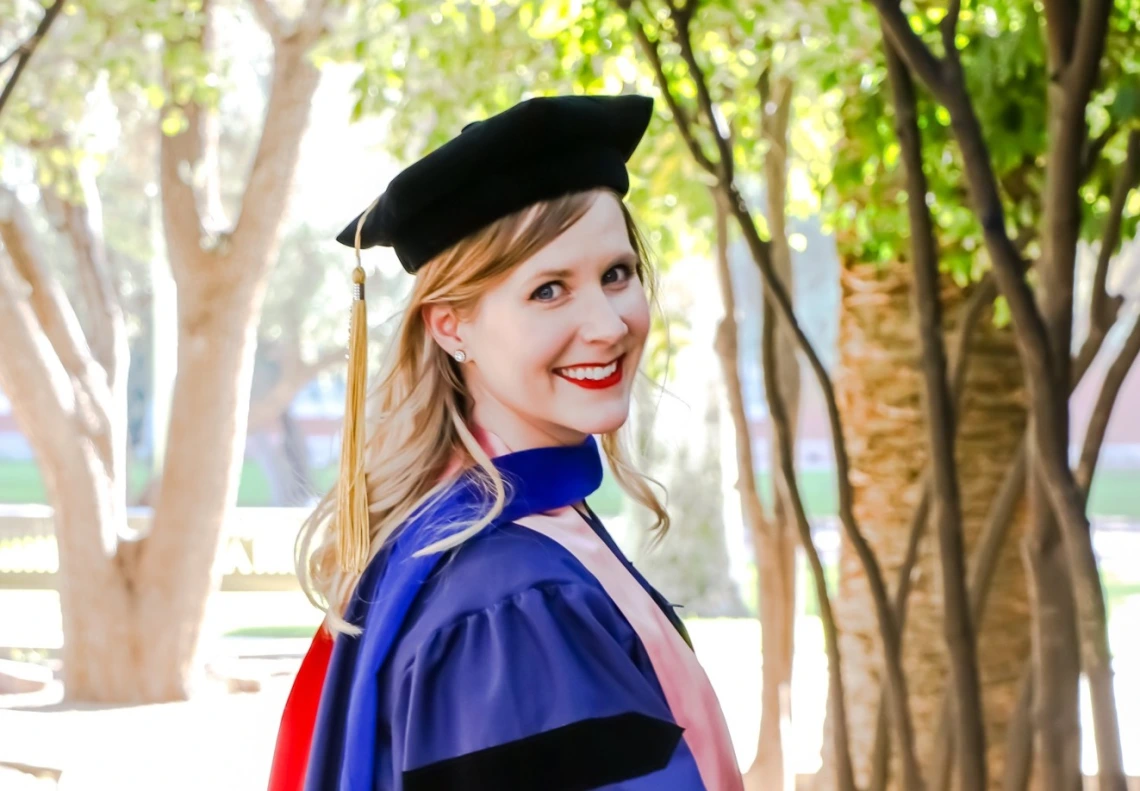New Faculty Profile: Get to know Meghan Skiba, PhD, MS, MPH, RDN

Credit: Angela Yung
Please join us in giving a warm welcome to Assistant Professor Dr. Meghan Skiba, who joined the College’s Division of Biobehavioral Health Science, on March 7. With a Master of Science in Nutritional Sciences, a Master and PhD in Public Health (both from the University of Arizona), Dr. Skiba brings with her a rich academic background and a keen interest in integrative health that makes her a perfect complement to our Wildcat Nurse faculty. Dr. Skiba recently completed a postdoctoral fellowship at Oregon Health and Science University with training in exercise science, human performance and functional mobility.
What drew you to a career in nursing?
Nursing is a holistic science that considers the entire person and incorporates relevant theories and concepts to improve clinical care and prevention and management of chronic disease. Nurses are the trusted point of contact for patients. It’s an honor to work together alongside nurses as part of an interdisciplinary team to improve the health of Arizonans.
“Nursing is a holistic science that considers the entire person and incorporates relevant theories and concepts to improve clinical care and prevention and management of chronic disease. Nurses are the trusted point of contact for patients. It’s an honor to work together alongside nurses as part of an interdisciplinary team to improve the health of Arizonans," ~ Meghan Skiba, PhD, MS, MPH, RDN
What attracted you to the UArizona College of Nursing?
UArizona College of Nursing is a research powerhouse, a leader in health sciences, and is a groundbreaker for innovations in aging. I have the opportunity to work with brilliant colleagues with diverse expertise in chronic disease, social determinants of health, integrative health, and aging, as well as data science and precision wellness. The College also is connected to research campus-wide, including the Collaboratory for Metabolic Disease Prevention and Treatment and University of Arizona Cancer Center. I really enjoy working with and mentoring students; the undergraduate and graduate students in the College of Nursing are engaged and motivated to pursue excellence in healthcare.
Can you describe your passion for connecting cancer survivors to the skills and health behaviors that will enable them to live their healthiest lives?
Most of us have had cancer impact us in some way at some point in our lives, either as the survivor or as the friend or family member of a survivor. It’s essential to remember people are represented by statistics of cancer incidence and mortality and all people are deserving of health. The World Health Organization defines health as: “a state of complete physical, mental and social well-being and not merely the absence of disease or infirmity.” A nutritious diet and engaging in physical activity have numerous health benefits. Building skills to improve these behaviors can promote optimal health. Additionally, because of the bidirectionality cancer diagnosis and treatment can have on the individual and their social connections, it is important to consider how our interventions can extend reach into those networks to magnify population health.
Can you tell us more about your research interests?
My research takes an integrative approach to develop health promotion interventions utilizing nutrition, exercise, and technology to mitigate biological aging among cancer survivor dyads. My three primary research areas are 1) intersection of diet and physical activity in cancer prevention and control, 2) digital and metabolic biomarkers of accelerated aging in adult cancer survivors, and 3) community based-participatory research methods and theory-informed clinical trial design.
How does your advanced training in nutrition science, epidemiology and health behavior inform your approach to nursing?
My multidisciplinary training informs my approach to nursing research through different perspectives. I aim to understand synergistic effects of nutrition and exercise and their roles in managing accelerated biological aging by considering the socioecological context in which health behaviors and health outcomes exist including social determinants, beliefs, skills, and equity. This leads to research designed to result in ecologically valid data and outcomes that are meaningful to patients and providers.
What is your teaching philosophy?
The pillars of my teaching philosophy are to engage students with learning inside and outside of the classroom, create a respectful, high-performance environment, and develop an effective healthcare workforce of integrity. My approach to teaching includes collaboration and experiential learning integrating curriculum and techniques that evolve with current research, social circumstances, and collective knowledge. I aim to empower learners through personalized pathways and increase accessibility to research by prioritizing lived experience, relevance, and acceptability.
Where are you from originally?
Depends on how far back you want to go. I was born in North Carolina and spent my early childhood in South Carolina before moving to Arizona around the time I started kindergarten. I grew up and attended primary and secondary school in Vail, Ariz. I have trained and worked at the University of Arizona, University of Houston, MD Anderson Cancer Center, and Oregon Health & Science University. I now permanently call Tucson and the University of Arizona home
What do you like to do in your free time?
One of my favorite ways to spend time is travel and adventuring to camp and hike with my family. I also enjoy yoga, indoor rock climbing, gardening, reading, DIY home projects, and tabletop gaming. Cooking is my love language and I love to bake and create new recipes.

